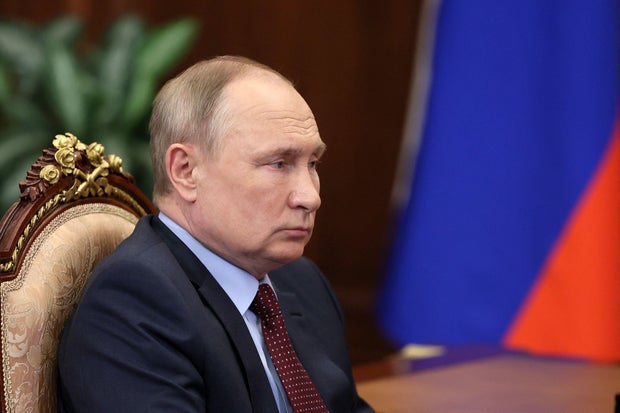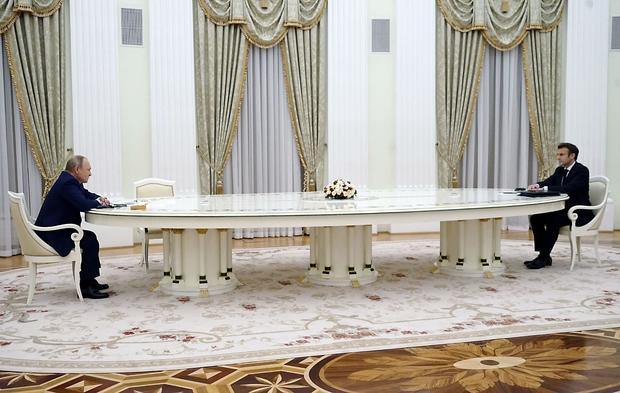Washington — Western officials are warning that Russian President Vladimir Putin could resort to increasingly brutal and extreme tactics in Ukraine as Russian forces struggle to achieve their military objectives and questions arise about Putin’s grip on power.
A senior U.S. defense official told reporters on Wednesday that Russian forces advancing toward Kyiv “appear to be stalled” and were suffering overall from “logistical and sustainment problems as well as integration problems.”
“The Russians will learn from these missteps and try to overcome them,” the official said.
President Biden said Wednesday that the Russian leader was “isolated from the world more than ever,” as a raft of sanctions destabilizes the Russian economy and Moscow’s invasion is met with near-global condemnation.
Observers of the Kremlin have noted that Putin, a former intelligence officer previously known for his restraint, has appeared uncharacteristically agitated, delivering meandering screeds and publicly lashing out at his aides.
“He was always cold, calculating and ruthless. You know, a KGB man through and through,” said Mike Vickers, a former undersecretary of defense for intelligence, special operations officer and CIA officer who played an instrumental part in arming the Afghan insurgency during the Soviet-Afghan War in the 1980s. “But he’s now more emotional, more erratic, more rambling, I think more reckless, perhaps from increasing self-isolation and confidence in himself.”
“This looks like a major strategic blunder that the potential losses way outweigh the gains,” Vickers added during a recent episode of CBS News’ “Intelligence Matters“ podcast. “And so I think in that sense, he really is a different man now, and therefore potentially more dangerous.”
Current and former officials and people briefed on U.S. intelligence say agencies have assessed that Putin is an experienced, calculating and rational actor with a distinct worldview, but who has in recent years — and especially during the COVID-19 pandemic — become more isolated and unpredictable, relying on a dwindling circle of advisers and aides.
Sources who spoke with CBS News were not aware of credible information that Putin, apart from being nearly 70 years old, is physically ailing or suffering from neurological issues that would leave him detached from reality.
U.S. policymakers are asking for fresh insights into his thinking from the CIA and other agencies, where leadership analysts are tasked full-time with profiling world leaders like Putin and other decision-makers in foreign governments. Their roles involve combining and analyzing different types of collected intelligence — information obtained from human sources, intercepted communications, and via other means — to determine leaders’ motivations and their potential vulnerabilities.
Some Western officials have argued that Putin, while less restrained, has for decades made no secret of his agenda, motivations or frustrations.
MIKHAIL KLIMENTYEV/SPUTNIK/AFP via Getty Images
“I think there’s been a logical, methodical plan that goes back a very long way, at least to 2007 when he put the world, and certainly Europe, on notice that Moscow would not accept the further expansion of NATO,” Fiona Hill, a longtime Russia expert and former National Security Council official, recently told Politico Magazine.
Former Polish Foreign Minister Radek Sikorski, who now serves as a member of the European Parliament, compared the current situation to the years leading up to World War II.
“Identical to the 1930s … the leader of a major nation-state was telling us publicly that he has a plan of conquest. And our mistake was to think, ‘This is too nuts; he can’t possibly mean it.’ Both of them did mean it,” Sikorski told CBS News in a recent interview.
“[Putin] wants to undo the collapse of the Soviet Union, and he’s been clear about that,” he added.
The French news agency AFP quoted an anonymous official in French President Emmanuel Macron’s office as saying that Putin is now “more rigid and isolated” than he has been in the past.
“The Putin that [Macron] met at the Kremlin was not the same that he had seen in December 2019,” the official said, referring to Macron’s February meeting with Putin at the Kremlin.
SPUTNIK/AFP via Getty Images
Concerns that Russia may soon employ prohibited weapons such as cluster munitions or thermobaric “vacuum” bombs have risen as unverified videos circulate on social media of their positioning on Ukrainian soil.
The International Criminal Court said Wednesday it would open an investigation into possible war crimes and crimes against humanity committed in Ukraine, after 38 nations signed onto a referral for an expedited inquiry.
Speaking in Vienna, Michael Carpenter, the U.S. ambassador to the Organization for Security and Co-operation in Europe, said in a speech on Thursday that the U.S. had credible information the Russians were keeping lists of Ukrainians to be killed or sent to camps following a military occupation.
“Given what we have seen in past Russian operations, we expect that the Russian Federation will try to force the population to cooperate through intimidation, abuse, and repression—including through targeted killings, kidnappings, detentions, and physical abuse,” he said.
Margaret Brennan and Eleanor Watson contributed to this report.

